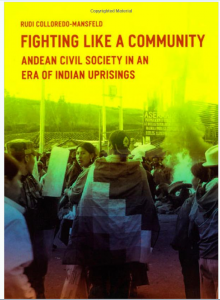Vernacular Statecraft and Indigenous Autonomy
Vernacular Statecraft and Indigenous Autonomy
My second book Fighting Like a Community: Andean Civil Society in an Era of Indian Uprisings (Chicago, 2009) details the ways that indigenous urban careers, agrarian livelihoods, and participation in local development have driven native politics. I looked at how residents of native communities insisted on a type of self-determination even as they tied themselves to jobs in the city. I brought these issues together with the notion of vernacular statecraft, or the use of the state’s own habits of governing to promote indigenous development and to organize uprisings against the state itself.
Other writings addressing indigenous politics:
2018 (with Angus Lyall and Malena Rousseau) “Development, Citizenship, and Everyday Appropriations of Buen Vivir: Ecuadorian Engagement with the Changing Rhetoric of Improvement.” Bulletin of Latin American Research. (PDF)
2018 (with Angélica Ordoñez, Homero Paltán López, Joe Quick, Diego Quiroga, Julie Williams) Conflicts, territories, and the institutionalization of post-agrarian economies on an expanding tourist frontier in Quilotoa, Ecuador. World Development 101, January 2018, 441-452. (PDF)
2016 Recordkeeping: ethnography and the uncertainty of contemporary community studies. In A Return to the Village: Community Ethnographies and the Study of Andean Culture in Retrospective , edited by F Ferriero and B.J. Isbel. London: Institute of Latin American Studies, University of London. (PDF)
2011 Politics of place and urban indígenas in Ecuador’s indigenous movement. In Histories of Race and Racism: The Andes and Mesoamerica from Colonial Times to the Present, edited by L. Gotkowitz. Durham: Duke University Press. 221-240. (PDF)
2008 Globalization from Below and the Political Turn among Otavalo’s Merchant Artisans. In The Ecuador Reader, edited by C. de la Torre and S. Striffler. pp. 377-384. Duke University Press, Durham. (PDF)
2007 The Power of Ecuador’s Indigenous Communities in an Era of Cultural Pluralism. Special issue of Social Analysis, edited by Edward Fischer 51(2) 86-106. Reprinted in Indigenous peoples, civil society, and the neoliberal state in Latin America. Oxford and New York: Berghahn Books, Edward Fischer, ed. (2008). (PDF)
2003 Tigua Migrant Communities and the Possibilities for Autonomy among Urban Indígenas. In Millennial Ecuador, edited by N. Whitten, pp 275-295. University of Iowa Press, Iowa City, IA. (PDF)
2002 “Don’t be lazy, Don’t lie, Don’t steal”: Community Justice in the Neoliberal Andes. American Ethnologist 29(3) 637-662.
2002 Autonomy and Interdependence in Native Movements: Towards a Pragmatic Politics in the Ecuadorian Andes. Identities: Global Studies in Culture and Power 9:173-195. (PDF)
2001 The Otavaleños of the Ecuadorian Highlands. In Endangered Peoples of Latin America, edited by S. Stonich, pp. 189-204. Endangered Peoples of the World, B. R. Johnston, general editor. Greenwood Press, Westport CT.
1998 “Dirty Indians,” Radical Indígenas, and the Political Economy of Social Difference in Modern Ecuador. Bulletin of Latin American Research 17(2):185-205.
